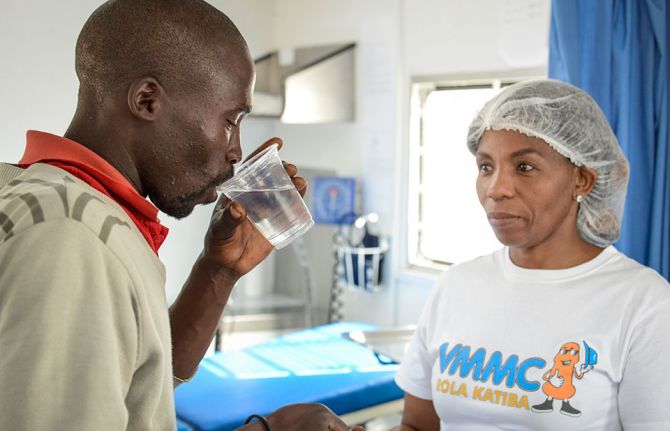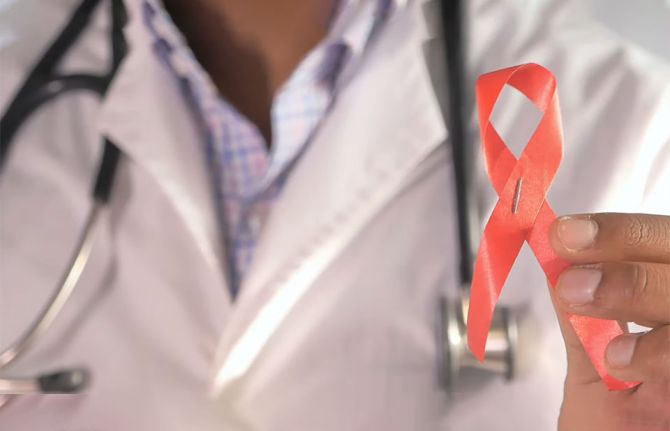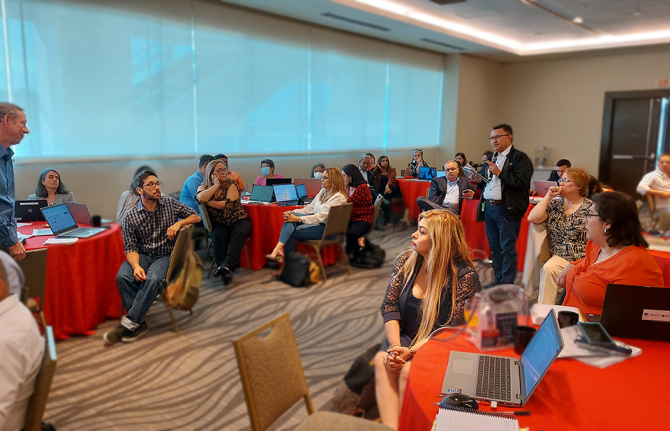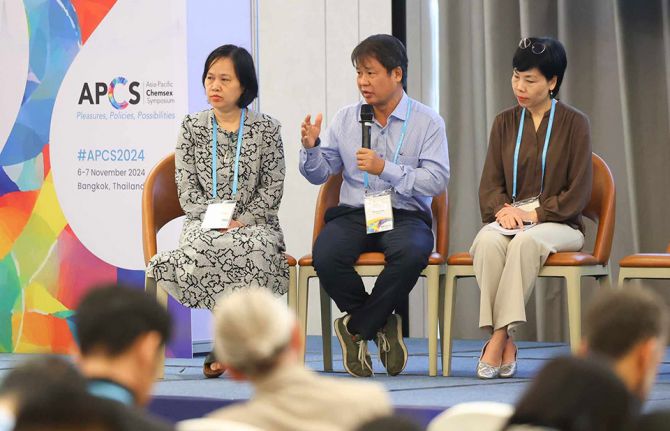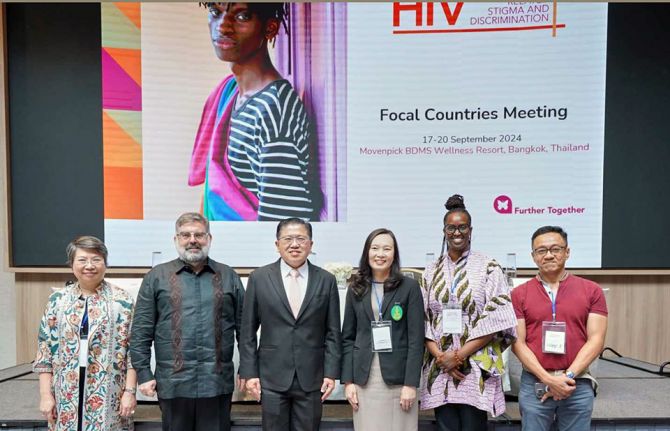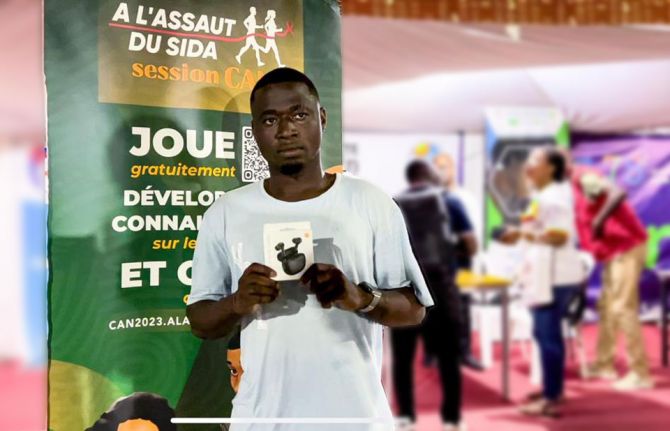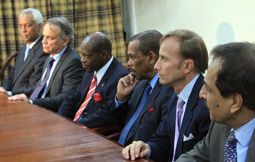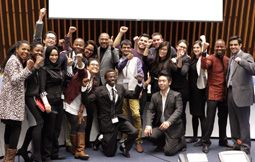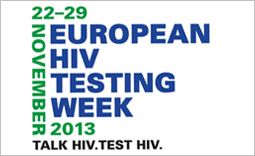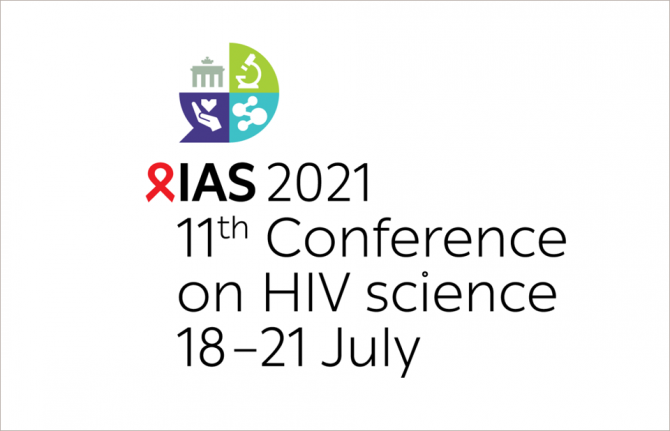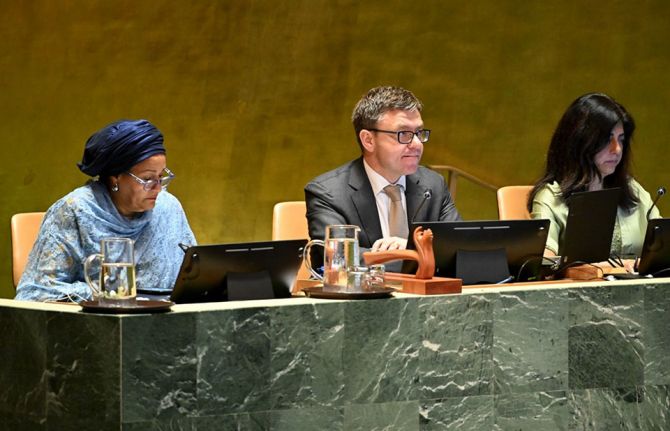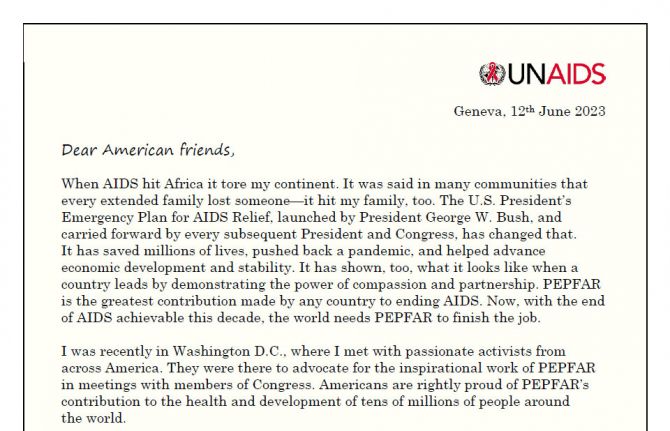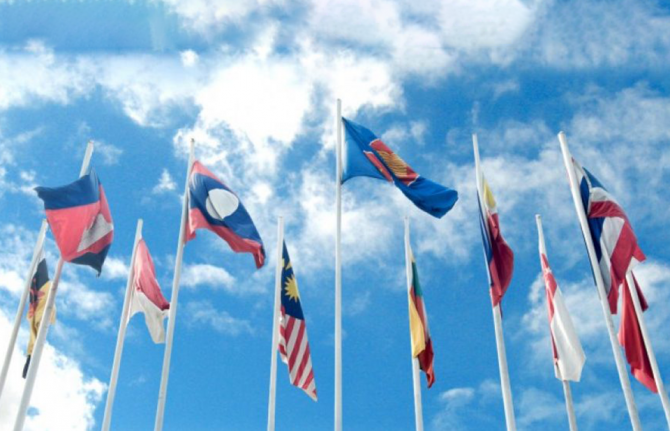
Feature Story
Providing community care in India
28 February 2008
28 February 2008 28 February 2008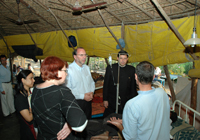
While in India Executive Director Dr Peter
Piot visited Sewa Ashram—a centre that
provides essential healthcare, support and
vocational training.
While in India Executive Director Dr Peter Piot visited Sewa Ashram—a centre that provides essential healthcare, support and vocational training.
In 1996 while driving through one night in Delhi, Ton Snellaert saw a man lying in the street. Driving on he saw hundreds more people sleeping by the roadside. The experience motivated him to set up a centre in one of Delhi’s northern suburbs and a year later the ‘Delhi House’ opened. In its first year, the small 12 room centre welcomed 45 people with care and support. Since then more than 3,000 have come through its doors and it is now better known as ‘Sewa Ashram’. Sewa is a Hindi word which means 'the practice of selfless service' and ashram means 'spiritual community'.
The clinic, staffed by three nurses and a medical doctor, offers free medical care and confidential TB and HIV counselling and testing. The centre has continued to grow and now offers TB treatment, a children’s education programme and vocational training.
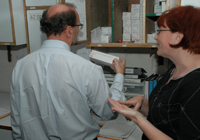
The clinic, staffed by three nurses and a
medical doctor, offers free medical care
and confidential TB and HIV counselling
and testing.
The Ashram has attracted volunteers from all over the world, brought together by the same passion for service. One of the volunteers is Kaye Kirsch who currently manages the Ashram. “Our community is based on compassion and focuses on restoring dignity while giving love and good healthcare to those that need it the most,” says Kaye Kirsch. “Many of our staff came through the doors in need of help and have chosen to stay at the centre and help others,” she adds.
Providing community care in India
Related links:

Feature Story
MDR-TB more common in people living with HIV
28 February 2008
28 February 2008 28 February 2008
According to the 4th World Health Organization (WHO) report on anti-tuberculosis drug resistance released on 26 February, multi-drug resistant tuberculosis* (MDR TB) has been shown to be almost twice as common in tuberculosis (TB) patients living with HIV compared to TB patients without HIV.
The report presents the findings of the largest survey of TB drug resistance to date with information collected between 2002 and 2006 from 90,000 TB patients in 81 countries. It demonstrates the highest rates of MDR-TB ever recorded with nearly half a million new cases of MDR-TB worldwide each year––around 5% of the total 9 million new TB cases. It also found that extensively drug-resistant tuberculosis** (XDR-TB), a virtually untreatable form of the respiratory disease, has been recorded in 45 countries.
The true scale of the problem also remains unknown in some pockets of the world. Only six countries in Africa—the region with the highest incidence of TB in the world***––were able to provide drug resistance data for the report, and none of these were able to provide information on drug resistance in people living with HIV. Other countries in the region could not conduct surveys because they lack the equipment and trained personnel needed to identify drug-resistant TB.
‘This report confirms the serious threat that drug resistant TB poses to people living with HIV,’ said Alasdair Reid HIV/TB Adviser, UNAIDS. ‘UNAIDS, together with WHO and our international partners, is working with TB and HIV programmes in countries across the world to ensure they work more closely together to prevent the development and spread of drug-resistant TB among people living with HIV through better diagnosis and treatment of TB in people living with HIV and improved TB infection control in HIV care settings and communities affected by HIV’.
WHO estimates that US$ 4.8 billion is needed for overall tuberculosis control in low- and middle-income countries in 2008, with US$ 1 billion needed to respond to drug resistant tuberculosis. There is currently a gap in financing of US$ 2.5 billion, including a US$ 500 million gap for drug resistant tuberculosis.
NOTE TO EDITORS:
* The bacteria responsible for TB becomes resistant when people who are ill with TB are not provided with or do not complete a full course of medication. Drug-resistant TB, like drug-sensitive TB, can also be transmitted through the air from an infected person to a non-infected person. MDR-TB is a form of TB that does not respond to the standard six month treatment using first line-drugs (i.e. resistant to isoniazid and rifampicin). It can take two years to treat with drugs that are 100 times more expensive than first-line treatment.
** XDR-TB is a form of TB caused by bacteria resistant to virtually all the most effective anti-tuberculosis drugs (i.e. MDR-TB plus resistance to any fluoroquinolones and any one of the second-line anti-tuberculosis injectable drugs: amikacin, kanamycin or capreomycin).
*** In sub-Saharan Africa HIV is dramatically fuelling the spread of TB which is a major cause of death among people living with HIV. MDR-TB and XDR-TB are highly lethal in people living with HIV––studies show case fatality rates of over 90%. Drug-resistant TB is therefore a major threat to the effectiveness of both TB treatment and anti-retroviral treatment programs.
MDR-TB more common in people living with HIV
Cosponsors:
Related links:
Publications:
Anti-tuberculosis drug resistance in the world (pdf, 2.4 Mb)

Feature Story
Microbicides 2008 concludes in India
27 February 2008
27 February 2008 27 February 2008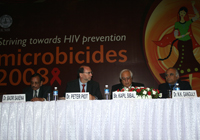
The biannual international microbicides
conference “Microbicides 2008” ran 24 –
27 February in New Delhi under the
theme “Striving towards HIV Prevention”.
Credit: Microbicides 2008
The biannual international Microbicides 2008 conference concluded Wednesday 27 February in New Delhi.
The scientific and networking conference was opened on Sunday by the Union Minister for Health and Family Welfare, Dr Anbumani Ramadoss.
More than 1,100 researchers, public health workers, communities and advocacy organizations gathered for the four-day meeting to discuss current research and development of a safe, effective and accessible microbicide which women could use to prevent the transmission of HIV and other sexually transmitted infections.
The meeting took place in the context of a year of mixed results in candidate microbicide clinical trials. A cellulose sulfate trial was stopped early due to safety concerns, while Carraguard, a candidate microbicide which completed large-scale Phase III trials, was found to be safe but not effective in preventing HIV transmission. These results were unexpected but all findings shed more light onto the research avenues.
The event ended on a positive and hopeful note. Addressing the closing ceremony, UNAIDS Executive Director Dr Peter Piot acknowledged the difficult time it has been for microbicide research but focused on the progress made in the field so far.
Emphasizing the importance of rising above these challenges and huge value of overcoming them, Dr Piot said in his speech, “Developing an effective microbicide will be a critical step forward in the AIDS response. To provide women with HIV prevention technology they can use themselves will be nothing short of revolutionary.”
The conference programme was overseen by an international scientific advisory committee and included plenary sessions, presentations of original research, round table discussion sessions, symposia and satellite meetings and poster sessions and exhibitions. A broad range of topics were discussed in four simultaneous tracks.
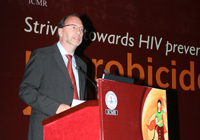
Dr Piot said in his speech that “Developing
an effective microbicide will be a critical
step forward in the AIDS response. To
provide women with HIV prevention
technology they can use themselves will
be nothing short of revolutionary.”
In the Basic Science track, topics included updates on the microbicide pipeline of current and emerging candidates, latest understanding of HIV sexual transmission, drug discovery, advances in formulations.
In the Clinical track lessons learned from cohort studies were explored as well as findings from Phase I, II and III Trials. Amongst other topics was the impact of other HIV prevention trials.
The Social Science track looked at behavioral and social science research tools, acceptability, lessons from managing the closure of multi-country HIV prevention trials and the role of men in microbicide use.
Under Community and Advocacy, many aspects of community engagement in trials were considered including managing stakeholder expectations of trial results and the importance of partnerships for HIV research.
Several cross-track discussions were also held, exploring challenges, experiences and lessons learned.
It is the first time that the meeting has taken place in the Asian region. Previous meetings have been held at Washington DC in 2000, Antwerp in 2002, London in 2004, and Cape Town in 2006. Each occasion takes researchers and activists further in their understanding of the challenges of microbicide development.
For all present this week in New Delhi, it is hoped that by the time of the next meeting in 2010, we will have turned a real corner on the road to delivery of a safe, effective and accessible microbicide which could make a difference to women’s lives.
For more information visit the Microbicides 2008 conference web site at http://www.microbicides2008.com/
Microbicides 2008 concludes in India
Partners:
Global Coalition on Women and AIDS
Global Campaign for Microbicides
Alliance for Microbicide Development
International Partnership for Microbicides (IPM)
Feature stories:
Microbicides: Why are they significant? (Part 1) (20 February 2008)
Microbicides: challenges to development and distribution (Part 2) (22 February 2008)
External website:

Feature Story
UNAIDS Executive Director receives prestigious humanitarian award
26 February 2008
26 February 2008 26 February 2008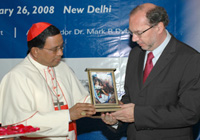
President of the Catholic Bishop’s Conference of India, Cardinal Telesphore P. Toppo presents UNAIDS Executive Director, Dr Peter Piot the “Blessed Mother Teresa International Humanitarian Award” at a ceremony held on 26 February 2008 in New Delhi, India.
The first ever ‘Blessed Mother Teresa International Humanitarian Award’ has been awarded to Dr Peter Piot, Executive Director of UNAIDS for the ‘significant impact he has made to the lives of people living with HIV in the developing world’.
Dr Piot was presented with the award by Cardinal Telesphore Toppo, President of the Catholic Bishop’s Conference of India at a special ceremony held in New Delhi on 26 February 2008. He will share the award with Ambassador Mark Dybul, the US Global AIDS Coordinator, who will be presented with his award during the Mother Teresa Memorial Annual Oration to be held at the Indira Gandhi National University on 3 March.
The award was established by the Health Commission of the Catholic Bishop’s Conference of India to recognise the work of dedicated individuals demonstrating similar humanitarian concerns to those of Mother Theresa herself.
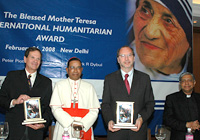 (From left): Mission Director, U.S. Agency for International Development (USAID) Dr George Deikun; President of the Catholic Bishop’s Conference of India, Cardinal Telesphore P. Toppo; UNAIDS Executive Director, Dr. Peter Piot; Executive Secretary, Commission for Health of the Catholic Bishops' Conference of India, Fr Alex Vadakumthala.
(From left): Mission Director, U.S. Agency for International Development (USAID) Dr George Deikun; President of the Catholic Bishop’s Conference of India, Cardinal Telesphore P. Toppo; UNAIDS Executive Director, Dr. Peter Piot; Executive Secretary, Commission for Health of the Catholic Bishops' Conference of India, Fr Alex Vadakumthala.Speaking at the award ceremony, Dr Piot said, “I accept this award as a recognition of the contribution of the whole United Nations family, and in particular by colleagues at UNAIDS, who work for the values closest to Mother Theresa’s heart – service to those in need. We are indeed driven by the ideals which she promoted through her life and her work which was marked by tolerance, compassion and inclusiveness.”
Dr Piot commended the Indian Catholic Church for its engagement in the AIDS response and support for people living with HIV continuing Mother Teresa's tradition of compassion and respect.
Blessed Mother Teresa of Calcutta was the Albanian-born founder of the Order of the Missionaries of Charity—a Catholic Congregation of women dedicated to helping the poor in India. She lived as a simple nun who touched the hearts of many and in 1979 received the Nobel Prize for Peace.
UNAIDS Executive Director receives prestigious hu
External links:

Feature Story
Microbicides: challenges to development and distribution (Part 2)
21 February 2008
21 February 2008 21 February 2008The biannual international microbicides conference “Microbicides 2008” will run 24 – 27 February in New Delhi under the theme “Striving towards HIV Prevention”.
The gathering will enable knowledge-sharing between microbicide researchers, public health workers and advocacy organizations and will provide a forum for the discussion of new developments in microbicide research including basic science, clinical trials and social science issues as well as discussion on behaviour, community engagement and advocacy.
In the second of a two part series looking at microbicides, we will be exploring some of these topics.
For several years, UNAIDS has insisted that the development of an effective microbicide is a public health priority and has emphasized the importance of access and affordability. However due to a lack of significant investment, the research and development pipeline has been slow and inefficient.
UNAIDS Executive Director, Dr Peter Piot said, “ The international community, including the private sector, must continue to invest in effective HIV prevention technologies that can be used by women .”
“Ensuring access to safe and effective microbicides will be of critical importance to all our prevention efforts and to our goal of stopping and reversing the epidemic.”
The cost of saving lives
The total global funding for microbicide research and development in 2006 done by the non-commercial sectors was $217 million. The pharmaceutical sector chooses to invest into the search for new antiretroviral drugs, attracted by a potentially large return-on-investment.
If there was comparable investment into microbicide research, it is thought that a safe and effective product would be on the market much sooner than a vaccine. However, as any microbicide would have to be affordable to consumers to whom it would make most difference – women living in low- and middle-income countries – the profit margins would be low. This economic reality makes microbicide research a less attractive investment.
As a consequence virtually all microbicide research is conducted by small biotech companies funded by the public sector.
Research and development pipeline
Research and development is continuing in spite of the large funding gap. More investment will be needed to bring clinical trials to completion and lay groundwork for distribution of an effective product.
As with any new drug, candidate microbicides must pass a series of rigorous laboratory tests and then a series of human clinical trials.
| What are the different phases of a clinical trial? Phase I clinical trials are the first stage of testing in humans and are designed to evaluate safety. Normally the trials are conducted in an inpatient clinic, where volunteers can be monitored closely. A group of 20-80 healthy volunteers will use the product for 1–2 weeks. Once the initial safety of the study drug has been confirmed in Phase I trials, Phase II trials are performed on larger groups of 20-300 and are designed to assess how well the product works, as well as to continue safety and tolerability assessments in a larger group of volunteers over 6–18 months. When the development process for a new drug fails, this usually occurs during Phase II trials when the drug is discovered to show no evidence of potential effect, or found to have toxic effects. Phase III studies are randomized controlled multi-centre trials on large groups (300–3,000 or more) and are aimed at being the definitive assessment of how effective and safe the drug is. Because of their large size and duration (1–2 years), Phase III trials are the most expensive, time-consuming and difficult trials to design and run. |
A range of contraceptive and non-contraceptive microbicide products are currently in different phases of development and trial including over 30 candidates in clinical trials. More than 30 others are in pre-clinical testing. However, results to date have been disappointing.
The microbicide search had an unexpected setback in February 2007 when an advanced Phase III study of a candidate microbicide Cellulose Sulfate was stopped early because women who used the gel were suspected to have a higher risk of HIV infection compared with women in the placebo group.
Earlier this week it was announced that Carraguard, a candidate microbicide that had completed large-scale Phase III trials, was unable to prevent HIV transmission. Encouragingly the product was found to be safe for long-term vaginal use making it the first microbicide Phase III trial to be completed without safety concerns. Researchers are hopeful this is a finding which will be built on.
“The next generation of antiretroviral-based microbicide products holds much promise. We do need to develop better safety biomarkers and improve measurements of adherence and we can learn much more from trials which have not resulted in an effective product,” said UNAIDS Chief Scientific Adviser, Dr Catherine Hankins.
Timing of microbicide availability
The Global Campaign for Microbicides estimated that if one of the products in advanced clinical trials proves to be effective, a microbicide could be ready for distribution in a small number of countries by the end of 2010. However, if the current sets of products do not prove effective, the timeline will be longer.
| Ethical considerations Advocates and civil society work hard to ensure that as the science proceeds, the rights and interests of trial participants and their communities are protected. In microbicide trials all women are provided with a comprehensive HIV prevention package including counselling on condom use and safe sex, supplies of free, high quality condoms and regular screening for HIV and other sexually transmitted infections. Well-run trials are vital to women’s positive perception of trial participation – participants have expressed the importance of having access to information, being treated with respect, having an opportunity to be listened to, access to HIV testing and counselling and access to condoms. It is also vital that trial designs take into account local social and community perceptions of HIV, health and sex and that participants who become HIV-positive during or after the trials have access to care and support services. UNAIDS and AVAC have published “Good participatory practice guidelines for biomedical HIV prevention trials” which sets out ten principles for community engagement throughout the research life cycle. International consensus has been reached and detailed in 1 9 guidance points on a range of topics including confidentiality, informed consent, control groups and potential harms, in the recently published UNAIDS/WHO guidance document “Ethical considerations in biomedical HIV prevention trials” |
Next steps
Next week’s Microbicide conference will be an important forum for the discussion of the challenging issues of research, financing, clinical trials and ethical considerations.
Experts will gather to hear updates on current and emerging candidate product trials and will debate a range of topics. UNAIDS Chief Scientific Adviser Dr Catherine Hankins will make presentations on the implications of the results of male circumcision trials for microbicide research and present findings from the December 2007 consultation “Making HIV trials work for women and adolescent girls”.
UNAIDS Executive Director Dr Peter Piot will address the conference closing ceremony which will be attended by politicians, policy-makers, scientists, community activists and other AIDS experts.
The London School of Hygiene and Tropical Medicine estimated by mathematical modelling that the introduction of even a 60% effective microbicide into the world’s 73 lowest-income countries which would be used by only 20% of women already in contact with health services could avert up to 2.5 million infections in three years.
With many observers confident that a successful microbicide could make a significant impact in HIV prevention around the globe, the wait is all the more frustrating, the set-backs all the more disappointing.
Microbicides: challenges to development and distr
Cosponsors:
Feature stories:
Microbicides: Why are they significant? (Part 1) (20 January 2008)
Making HIV trials "work for women" (12 December 2007)
Women and HIV research - report from meeting (11 December 2007)
Experts meet on women and HIV trials (part III of three-part series) (07 December 2007)
The role of women in HIV trials (part II of three-part series) (05 December 2007)
Meeting ethical concerns over HIV trials (part I of three-part series) (03 December 2007)
Funding estimates for AIDS research and development (30 August 2007)
Multimedia:
Listen to UNAIDS Chief Scientific Adviser Dr Catherine Hankins on Microbicides 2008
External links:
Related

Feature Story
Journal of Internal Medicine: Review article by L. O. Kallings
21 February 2008
21 February 2008 21 February 2008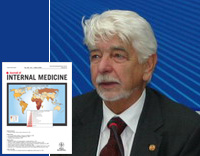
Professor Lars O. Kallings is also UN Special Envoy for AIDS in Eastern Europe and Central Asia
The March issue of the Journal of Internal Medicine published today features a review article by Professor Lars O. Kallings entitled “The first postmodern pandemic: 25 years of HIV/ AIDS”.
In the 26-page article Professor Kallings gives a biomedical overview of AIDS looking into the characteristics of AIDS and the scientific search for preventative technologies. He traces the changing epidemiology of HIV from its earliest reports to today’s incidence and distribution in different regions of the globe. The varied social and political aspects of AIDS and the global response to it are also examined.
The review explores disinformation and misconceptions around the issue of AIDS and discusses prospects of finding a cure and other future scenarios.
Professor Lars O. Kallings was appointed UN Special Envoy for AIDS in Eastern Europe and Central Asia by the UN Secretary-General in May 2003.
Engaged in the AIDS response for over 20 years, he has held positions including adviser to the World Health Organization, Chairman of the Global Commission on AIDS and Senior Adviser to the Global Programme on AIDS on Scientific and Policy Affairs. He is currently honorary Chairman of AIDS Accountability International. He is Founding President of the International AIDS Society (IAS) and was its Secretary-General 1994–2002.
Professor Kallings wrote this review as an independent scientist and its content does not necessarily represent the views of the UN or any organization to which the author is, or has been, affiliated.
Journal of Internal Medicine: Review article by L
Feature stories:
Professor Lars Kallings’ advocacy visit to Belarus (October 2006)
External links:
Publications:
The first postmodern pandemic: 25 years of HIV/ AIDS - L. O. Kallings (2008)
Journal of Internal Medicine, Volume 263 Issue 3 Page 218-243, March 2008
Related

Feature Story
Microbicides: why are they significant? (Part 1)
20 February 2008
20 February 2008 20 February 2008Ahead of next week’s biannual international microbicides conference Microbicides 2008 running 24 – 27 February in New Delhi we take an in-depth look at microbicides. In part 1 of this 2-part series we look at why they are considered significant in the response to HIV. In part 2 the challenges to the development of this biomedical prevention technology will be explored.
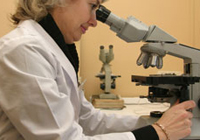
While the search for a HIV vaccine looks
set to continue for some years, many
believe that with similar investment a s
uccessful microbicide could be developed
much sooner.
With 2.5 million people newly infected with HIV in 2007 there is global consensus on the need for new HIV prevention technologies to complement existing strategies.
While the search for a HIV vaccine looks set to continue for some years, many believe that with similar investment a successful microbicide could be developed much sooner. An effective microbicide would offer significant protection to women who currently comprise about half of all people living with HIV worldwide.
UNAIDS works with number of microbicide networks to highlight the critical need for female-controlled prevention options.
Along with other global advocates, UNAIDS continues to emphasize the importance of a concerted effort to develop microbicides and make them accessible to the people that need them. Addressing women’s needs for HIV prevention is vital for curbing the epidemic.
Why do women need specific HIV protection?
It is an uncomfortable reality that many women across the globe do not have power over what happens to their own bodies.
Deep-seated social and cultural norms and the effects of gender inequality mean many women and girls live with violence or the threat of violence and are unable to successfully negotiate fidelity or condom use.
Women who sell sexual services are often unable to negotiate the wearing of condoms with their clients.
Even women abstained from intercourse before marriage and have only one sexual partner can be vulnerable to sexually transmitted infections from partners if that partner engages in unprotected sex with other women or men.
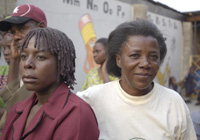
“Microbicides will be a key tool in
empowering women, and in halting the
alarming spread of HIV infection among
women” - Director of the Global Coalition
on Women and AIDS, Kristan Schoultz.
Credit: UNAIDS/C.Gira
Due to biological differences, in unprotected heterosexual intercourse women are at least twice as likely as men to acquire HIV from an infected partner. HIV data reflects this, for example among young people (15-24 years) in sub-Saharan Africa an estimated three young women are HIV-positive for every young man.
Experts believe if women have the option of using a microbicide to protect themselves from HIV it could make all the difference to their lives.
“A man may refuse to wear a condom and his partner may be powerless to insist. Access to safe and effective microbicides will offer women more choices and help them take charge of their sexual health and their future,” said Director of the Global Coalition on Women and AIDS, Kristan Schoultz.
“Microbicides will be a key tool in empowering women, and in halting the alarming spread of HIV infection among women,” she added.
What is a microbicide?
A microbicide is a compound whose purpose is to reduce the infectivity of viruses or bacteria. The term has come to refer to a potential product which would prevent the transmission of HIV and other sexually transmitted infections (STIs) inside a woman’s vagina. A rectal microbicide would act similarly to protect men who have sex with men and women during anal intercourse.
There are different candidate microbicide products currently under research and development; many are in the form of a gel or cream to be applied to the surface of the vagina. Scientists are also exploring other ways of drug delivery such as by a vaginal ring which would be inserted into the vagina and provide controlled release of an effective microbicide.
Mechanisms of action
A successful topical microbicide – applied to the vagina surface - would probably act in a combination of ways. Scientists are researching different products which would:
- Kill pathogens without damaging the healthy cells of the vagina
- Strengthen the body’s natural defence system by increasing the natural acidity of vagina inactivating athogenic viruses and bacteria
- Inhibit the virus getting into the white blood cells – the target cells of HIV
- Inhibit viral replication by using derivatives from anti-retroviral drugs
For some women, it is important that the action of the microbicide not impair their ability to conceive a baby. Both contraceptive and non-contraceptive microbicides are currently under development, as well as rectal microbicides for heterosexual women and men who have sex with men.
No silver bullet

The biannual international microbicides
conference “Microbicides 2008” will run
24 – 27 February in New Delhi under the
theme “Striving towards HIV Prevention”.
Credit: Microbicides 2008
Some advocates believe that the successful development of a microbicide would bring significant emancipation for women who due to cultural, economic and social drivers are disempowered and unable to protect themselves from HIV.
With the stakes so high, microbicides seem like a very attractive solution. However experts are realistic about the complexity of the research task and drug efficacy and urge caution over raising unrealistic expectations.
Successful microbicides products will be partially protective. Although they may be up to 80% effective in preventing the transmission of HIV during sexual intercourse, they would need to be complimented by other prevention tools in a combination prevention strategy.
A comprehensive HIV prevention package includes, but is not limited to, delaying sexual debut, mutual fidelity, reduction of the number of sexual partners, avoidance of penetration, safer sex including correct and consistent male and female condom use, and early and effective treatment for sexually transmitted infections.
In part 2 we look at the challenges in current microbicide research and development and explore why there is a large funding gap between what is needed to bring clinical trials to completion and lay groundwork for effective distribution and what is currently available. We also look at the ethical considerations of clinical trials.
Microbicides: why are they significant? (Part 1)

Feature Story
Overview of this year’s Conference on Retroviruses and Opportunistic Infections (CROI)
18 February 2008
18 February 2008 18 February 2008
15th Conference on Retroviruses
and Opportunistic Infections took place in
Boston 4-6 February 2008. Credit: CROI
The annual Conference on Retroviruses and Opportunistic Infections (CROI) began in 1994 as a small meeting of scientists studying HIV and clinicians treating people with HIV. It is now one of the most important annual HIV gatherings and provides a forum for basic scientists, clinical investigators, and global health researchers to present, discuss, and critique their investigations into the epidemiology and biology of human retroviruses and the diseases they produce.
The 15th CROI concluded in Boston on 6 February and while announced trial results were not encouraging, many significant topics were discussed. The absence of a scientific breakthrough in HIV vaccine development underscores the need to scale-up existing prevention and treatment strategies.
HSV-2 trial - No observed reduction in risk
Disappointing results were announced from trials to see if ongoing treatment of the virus that causes herpes in humans, herpes simplex virus type 2 (HSV-2), would reduce the risk of HIV transmission. HIV-negative people with HSV-2 were asked to take medication to suppress outbreaks of herpes. However, the trial results showed no difference in rates of HIV infection between individuals who had taken the medication and those who hadn’t.
Scientific data shows a link between HSV-2 infection and susceptibility to acquiring HIV infection and there are other on-going trials exploring different aspects of this link, so researchers remain cautiously hopeful about this avenue of research.
Male circumcision
Previously-released data from the studies of male circumcision in Uganda which were stopped in December 2006 were presented by trial investigator Maria Wawer. One trial explored whether circumcising a HIV-positive man reduced the risk of HIV transmission to his HIV-negative female partner. Results showed a trend towards increased HIV transmission from men to their female partners. This trend was more notable, although still not statistically significant, when the men resumed sex before their wound had healed completely.
While this data is not new, its presentation at CROI gave an opportunity for discussion and analysis of its implications. Advocates stressed the necessity for all male circumcision programmes to directly address women’s increased vulnerability to infection by sex with a recently-circumcised, HIV-positive man.
UNAIDS Chief Scientific Adviser Dr Catherine Hankins said, “This underlines the importance of considering male circumcision as part of a comprehensive prevention package which includes couple counselling and post-surgery advice involving both partners. Couples should consider a mutual commitment to abstinence until the wound is healed completely.”
UNAIDS guidelines recommend that all men undergoing male circumcision should be clearly instructed and supported to abstain from sexual intercourse until certified wound healing, which normally can take up to six weeks, to avoid increasing the risk of both acquiring and transmitting HIV.
Most importantly, individuals must understand that male circumcision does not afford complete protection against HIV infection and that it must not replace other prevention strategies such as correct and consistent use of male and female condoms, reduction in the number of sexual partners, avoidance of penetration, and treatment of sexually transmitted infections.
Vaccines
Last September there was a disappointing failure in Merck’s adenovirus- based HIV vaccine candidate. The consensus from experts at CROI was that it was important for scientists to go back to the drawing board of basic science to get a better understanding of the workings of the virus and the responses of the human immune system. There was a call for increased investment into basic scientific research and less emphasis on expensive clinical trials, although clearly both are needed.
There is a growing acceptance that the search for the elusive HIV vaccine is set to continue for some time. This underscores the need to scale-up existing prevention and treatment strategies and highlights the importance of improving people’s access to sexual health information, access to HIV testing and counselling services and to male and female condoms.
Other interesting topics under discussion at CROI included improved screening for TB, ensuring adequate representation of women in HIV trials, aging and AIDS, and paediatric and adolescent HIV care.
Overview of this year’s Conference on Retroviruse
Related links:
Press Centre:
WHO and UNAIDS press release on male circumcision for HIV prevention (28 March 2007)
Feature stories:
Experts meet on women and HIV clinic trials (07 December 2007)
International experts review male circumcision (07 March 2007)
Publications:
Safe, Voluntary, Informed Male Circumcision and Comprehensive HIV Prevention Programming. Guidance for decision-makers on human rights, ethical & legal considerations (June 2007)
New Data on Male Circumcision and HIV Prevention: Policy and Programme Implications. (March 2007)
Related

Feature Story
Top scientists discuss global health challenges in Boston
15 February 2008
15 February 2008 15 February 2008
L to R: Timothy E. Wirth, President, United
Nations Foundation and Better World Fund,
Jim Yong Kim, Harvard Medical School,
David Baltimore (moderator), AAAS
President, California Institute of
Technology and UNAIDS Executive
Director Dr Peter Piot.
The 2008 Meeting of the American Association for the Advancement of Science took place in Boston, USA from 14-18 February and brought together science and technology professionals from 56 countries to discuss the latest scientific breakthroughs and challenges.
President of the AAAS, Nobel Prize winner Mr. David Baltimore, said that the event was the ‘largest and most important interdisciplinary scientific gathering of the year’. The main focus of the conference was on the power of science, technology and education, to assist less developed segments of world society while improving cooperation among developed countries and spurring knowledge-driven transformation across scientific disciplines.
Some 10,000 people attended the conference including leading scientists, engineers, educators, and policy-makers as well as members of the national and international media.
The meeting ran under the umbrella theme of "Science and Technology from a Global Perspective" and the program highlighted areas of research, new developments, and cross-cutting activities in support of science, technology and education around the world.
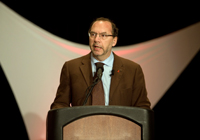
UNAIDS Executive Director Dr Peter Piot
spoke on a plenary panel session on
Global Health Challenges on Monday 18
February.
Among the 150 symposiums and presentations was a round table discussion on the state of public health which focused particularly on AIDS and tuberculosis; presentations on the search for a global AIDS vaccine and the challenge of comprehensive HIV control in sub-Saharan Africa.
UNAIDS Executive Director Dr Peter Piot spoke on a plenary panel session on Global Health Challenges on the closing day of the conference together with Jim Yong Kim from the Harvard School of Public Health and Timothy Worth, President of the UN Foundation and Better World Fund. The session was moderated by AAAS President David Baltimore.
Top scientists discuss global health challenges i
Related links:
Related
 An HIV vaccine: who needs it?
An HIV vaccine: who needs it?

21 July 2021
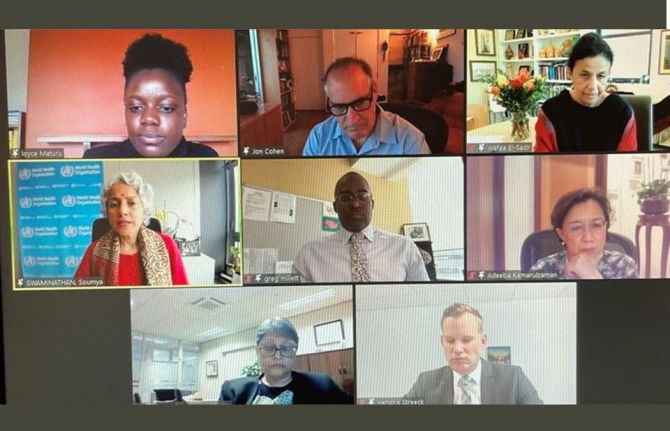 Science, HIV and COVID-19—where are we headed?
Science, HIV and COVID-19—where are we headed?

08 June 2021

Feature Story
To Our Partners
13 February 2008
13 February 2008 13 February 2008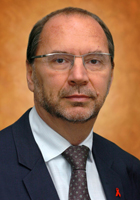
It is now 12 years since UNAIDS started work, 12 years in which the Joint United Nations Programme on HIV/AIDS has matured into a truly global institution, supporting national AIDS responses in more than 80 countries.
During those 12 years, we have established close relationships with a wide range of partners—networks of people living with HIV, governments, businesses, community groups, advocacy groups, religious organizations, foundations, scientific institutions, and the United Nations family. These partnerships are critical: without them, we at UNAIDS would not be able to do our work.
Because of this, I wanted to share with you our priorities for 2008. This year we have five focus areas. First we have to make the significant domestic and international money being made available—work the best that it can. We will intensify our technical and policy support to help countries scale up towards universal access to HIV prevention, treatment, care and support. Halfway towards the Millennium Development goals—we aim to do a better job of sharing information about the progress that countries have made in reaching their targets—information that could help unblock challenges faced by others.
The second is to intensify country-level action on HIV prevention, gender equality and human rights—interrelated areas that need broad engagement. We will mobilise and build capacity to support planning, costing and implementation of prevention programmes that reduce HIV risk, vulnerability and impact. And we will work with a range of stakeholders to build demand, capacity and resources for HIV prevention, while continuing to support the further roll-out of HIV treatment.
The third is to enhance the provision of practical strategic information. The 2007 AIDS epidemic update report showed just how complex the epidemic has become. We can no longer describe this epidemic in simple global figures. We have to tell the story of what is happening in countries in all their diversity. Over the next year we will further refine our reporting on the epidemic and the response. We will continue to strengthen data collection, and work with others to enhance the analysis of this information. In August, we will publish a new Global Report on the AIDS epidemic with the most up-to-date information on progress at country level.
The fourth focus is to ensure that the AIDS response contributes to wider development processes and outcomes. We want to highlight, through reporting results, the difference that HIV programmes are making towards achieving the Millennium Development Goals. We will use this knowledge to support global policy, particularly for the health related MDGs, but also for issues such as aid effectiveness and long-term predictable financing.
And the fifth area is to develop a much longer term, more strategic approach. We have to build on what has been achieved so far, and find ways to accelerate and then sustain this in the future. The rate of new HIV infections per year is declining, but the need for prevention, treatment, care and support is increasing. We have to find new ways to fill existing gaps—notably around HIV prevention and the volatility of development assistance. Because if we don’t find ways to address those gaps now, we will not be able to sustain the AIDS response over the longer term.
So 2008 is really a year of demonstrating and building on results. It’s about making sure those results provide maximum benefit in the decades to come. We look forward to working with you to make this happen.
Best regards,

Dr Peter Piot
Executive Director




